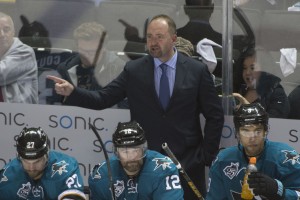It was apparent to everyone. The Pittsburgh Penguins love to play really fast hockey. They happen to be very good at it. It is a major reason they are in the Stanley Cup Final.
In the three playoff series which took the San Jose Sharks to the Final, they played faster hockey than their bigger, heavier opponents. Somewhere along the line, people starting thinking the Sharks were also a really fast team. They aren’t. The faster team won the opening game of the Stanley Cup Final on Monday night.
Controlling Play
Pittsburgh outplayed the Sharks for lengthy stretches, at times dominating San Jose. For a healthy chunk of the second period, the Sharks took control. Aided by a power play, their push helped to even the score at 2-2. The tying goal came on a shift where defenseman Brent Burns took over. Burns took the puck deep into the offensive zone, overpowering defenders. As play continued, Pittsburgh’s defense became more and more scattered. The Sharks controlled the puck, working it back to Burns at the point. Burns fired a shot. The rebound went to the stick of Patrick Marleau, who took the puck from the goalie’s left, went behind the net and used a wraparound move to score the goal. It was the sort of play San Jose needs. Playing with power opened things up for San Jose on the goal. Unfortunately for San Jose, that play was more of an exception than a norm.
http://gty.im/535939824
Pittsburgh’s speed helped them create open ice and odd man rushes. The Pens first two goals came because they entered the zone with speed and were able to get scoring chances before the Sharks defense could set up. As impressive as Pittsburgh’s offensive speed game was, their defensive speed was more important. Even with the puck, the Sharks looked uncomfortable much of the game and in all three zones. They rarely settled the play. They did not grind out lengthy shifts in the offensive zone, ones that wear defenders down and draw penalties, even if they fail to score. Instead, the Sharks often rushed play and as a result, committed numerous errors, many unforced. It is often better for San Jose to take the puck into a corner and battle for it rather than try to press the play by attempting to be faster team. They are not the faster team.

The Sharks managed to stay in the game because of outstanding work by goalie Martin Jones. The key to the Penguins’ winning goal was Brent Burns losing his stick, leaving him unable to block Kris Letang’s feed to Nick Bonino. Bonino flipped the puck past Martin Jones to make the score 3-2, which became the final score a few minutes later. It was not a fluke goal, but I’ve noticed some suggesting the Sharks were unlucky. I saw it differently. The Sharks were very lucky to be tied late in the game with a chance to steal it. They could have easily been down multiple goals.
Impose
Before the start of the series, Sharks coach Peter DeBoer spoke about the team’s need to “impose” their will, their style of play, on the opponent. After Game 1, DeBoer stated it was Pittsburgh who had imposed their game on San Jose.

If San Jose decides to be a fast team in this series, they’ll be the second fastest team on the ice. Which means they’ll squander advantages they have over Pittsburgh in other aspects of the game. In Game 1, Pittsburgh played to their strength and San Jose let them. If the Sharks want a series with a different outcome from Game 1, they will need to impose their style of game on Pittsburgh. It’ll mean the game gets decided battling in the corners, on the half wall and around the crease. It does not mean the Sharks need to play slowly. They can play at a good a pace, but they need to be more controlled. They need to pick their spots to play fast and exploit specific matchups. If they get caught up trying to match Pittsburgh’s almost continuous fire drill pace, its bad news for the Sharks. The Sharks played with fire in Game 1 and got burned.
It will not be easy for the Sharks to impose their will. If the Sharks fail to do this, however, it is likely the other guys will hoist the Stanley Cup.
Zeke’s Notes
San Jose has been rather tepid when they need to skate six to try to catch up late in a game. Even with the power play, meaning they were skating 6-on-4 in the final minute, San Jose did little against Pittsburgh in Game 1. When the situation is reversed however, and it is the opponents net which is empty, the Sharks have given up more than their share of goals this postseason. In one game earlier in the postseason, Nashville actually scored twice against the Sharks with their net empty.
If the Sharks want to play a better puck possession game, the face-off circle is a good place to start. The third line combo of Joel Ward and Chris Tierney won just four of 16 face-offs in Game 1. That is 25%. Tierney is 44% for the playoffs, Ward 38%.